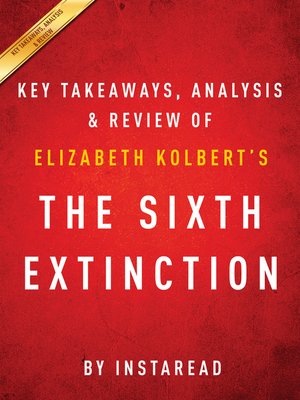


And the bigger story is all of these ways that we’re changing the planet on a permanent basis: climate change, ocean acidification, moving things around the planet, scrambling the biosphere, and changing the surface of the earth-all the ways in which we are permanently inscribing ourselves on the history of the planet. It was like the story just kept getting bigger and bigger.

Was writing about extinction a tactic so that you could write about the effects of climate change in a more concrete way? Was it a way to make it a story that was easier to connect to for readers? No, it was more that I came to see that climate change was part of an even bigger story. One paleontologist I know speaks about the history of life on earth as “long periods of boredom interrupted occasionally by panic.” We seem to be in one of those panic moments now, and we don’t know what the outcome is going to be, including for ourselves. So if you want to look at it purely from a human-centered point of view, I’d say, “Well, if you were choosing a moment to be alive on earth, you would not choose a moment of mass extinction it’s a very risky moment to be alive.” And though we can’t predict what the outcome of those kinds of events is going to be for any particular species, the past has shown us that odds are it will be very, very bad for a lot of them. If you’re asking, “Really, literally, what does extinction mean to me, sitting here in Manhattan”-or wherever one is sitting-the second, more practical answer is that there have been moments in the past where diversity has suddenly plummeted and cascade effects have taken place. If you don’t care about life on earth, what do you care about? It would be hard for me to imagine exactly what that would be. We are unraveling that fabric very, very quickly.

The first is this: What we are really talking about here is the fabric of life itself-the beauty and diversity of life on this planet. I’d say there are two answers to this question. Why should we care about extinction? I get asked that question a lot, and I have to say that at first I was surprised by it. Kolbert, a staff writer at The New Yorker and the author of Field Notes from a Catastrophe: Man, Nature, and Climate Change, recently spoke with Tricycle contributing editor Sam Mowe about writing on extinction, geological and evolutionary history, and how humans have changed the face of the planet as no other animal has done. Journalist Elizabeth Kolbert’s most recent book, The Sixth Extinction: An Unnatural History, takes a hard look at the science and intellectual history of extinction as well as the human role in this current mass extinction.


 0 kommentar(er)
0 kommentar(er)
